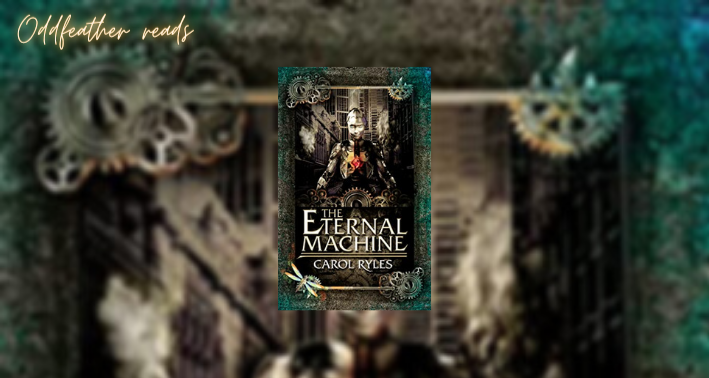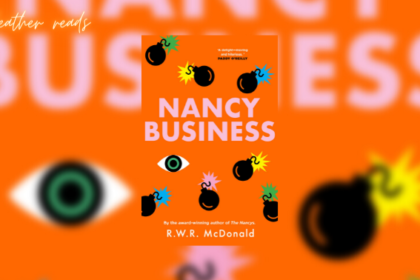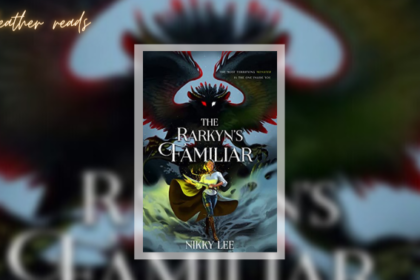Contains light spoilers
Carol Ryles’ debut novel The Eternal Machine is an imaginative and intricate Steampunk epic that explores the murky, intriguing spaces between science and the occult, loyalty and oppression, cruelty and rebellion in the fictional city of Forsham.
Em is a commoner, born of low status, who is gifted with a magic that she is not supposed to have. Ruk is a shapeshifter, an ancient being who wears the souls of the dead and carries the memories of every soul he has ever inhabited. Grindle is an industrialist mage, born into wealth and privilege but missing the magic that is supposedly his birthright. Grindle and people like him have a stranglehold on Forsham, controlling wealth, workers, and also the potent heart magic that only they are allowed to use. Strict laws govern who can wield this type of magic, so that when commoners are born with it, they must keep it hidden. Grindle, in his endless quest for power, wants to correct the balance of being born without magic, and sets in motion a series of events that threatens not only lower-class magic-holders, but the entire city. In this setting, and through a strange and cruel twist of Fate, Em and Ruk are thrown together on a quest to save Forsham from Grindle and his all-consuming greed.
After losing the few things keeping her in her old life, Em finds herself having to make a choice: continue being drained of magic for the meagre income that will maybe one day buy her a brighter future, or join the rebellion led by the reclusive Groundists to fight back and make Forsham a better place. When Ruk arrives in her life, bringing with him unexpected revelations about the power she holds, Em leaves the streets and slums she grew up in and plunges into a world of dangerous espionage, cursed machinery, and a group of rebels tightly bound by loyalty and purpose. But even they don’t know the depth of the darkness that is growing in Forsham, both in machines and in magic, a darkness that will devour everyone if it isn’t stopped. As the situation becomes more dire, Grindle seems to be growing ever crueller and more reckless, and he wants the Groundists stopped before they uncover any more of his heinous work.
Interspersed with chapters from Em and Ruk’s points of view in the present are chapters about Grindle’s life decades earlier. Despite learning his somewhat humanising backstory, Grindle is, in fact, one of the most hateable antagonists I have ever come across. He combines all the worst elements of classism, capitalism, and hypocrisy, and every time he shows a little humanity it is overshadowed by another casually cruel action that drives home just how awful he is. We learn, in these brief, horrifying glimpses, how Grindle inflicted the current state of desperation and despair on the people of Forsham. It is rare to find a villain who is so totally irredeemable!
This story has many moving parts and many interesting characters, all with their own histories and competing desires. The rebels that make up the Groundists are particularly compelling, a band of outcasts and misfits who fit between the economic and class systems that make up the society of Forsham. I found that, the further I read into the story, the more details I needed to hold onto regarding each character’s origin and motivation, the many aspects of the magic system that were coming into play in each scene, and how each character reacted to every other character and what that meant for the plot. It is a lot to hold onto, but it makes for a rich and rewarding storytelling experience, which is a feature of Steampunk stories that I have also found from other authors in the genre. The elaborate systems that form the basis of science and magic bring to mind Philip Pullman’s His Dark Materials series and the Dust that is the basis for all life. As well, the melding of humans and machines recalls characters from Philip Reeves’ Mortal Engines extended universe, in which soldiers are created using alchemy to trap souls in bodies enhanced by machinery. But the scientific and occult aspects of The Eternal Machine are unique, and thoroughly explained throughout the novel by the character’s discoveries and explorations of Grindle’s machines and experiments.
Ryles’ intricately designed system embodies everything from the organs that humans are born with that channel their connection to Fate, and thus magic, to the strange and often disturbing intersections of those magical elements with engineering. For example, in this world automatons can be given souls, and magic is a power source that can be harvested and used to run machines. Thus humans, particularly poor and under-privileged humans, slowly become nothing but batteries to the owners of factories, cells to be drained for profit in the creation of wealth and furthering of industry.
The Eternal Machine is an inventive and elaborate debut novel firmly within the Steampunk sub-genre of science fiction, and Ryles has crafted a one-of-a-kind magic system that both underlies and drives the plot throughout. Balancing the elegant world-building is a rich cast of colourful characters that bring the city of Forsham and its dark workings to life. I’d recommend this book to anyone who enjoys detailed world-building, Steampunk fiction, or dark fantasy epics!
I was provided a free copy of this book by the publisher in return for an honest review.





